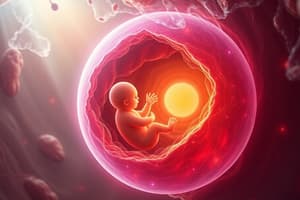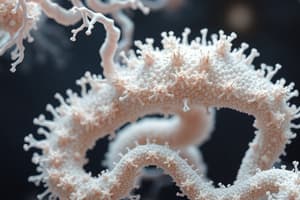Podcast
Questions and Answers
¿Qué fase del proceso de embriogénesis implica la reorganización de células para formar tres capas distintas?
¿Qué fase del proceso de embriogénesis implica la reorganización de células para formar tres capas distintas?
¿Qué estructura se forma durante la fase de clivaje en embriogénesis?
¿Qué estructura se forma durante la fase de clivaje en embriogénesis?
¿Qué guía a las células a sus ubicaciones apropiadas durante la organogénesis?
¿Qué guía a las células a sus ubicaciones apropiadas durante la organogénesis?
¿En qué fase del desarrollo embrionario se observa una rápida división celular sin un aumento significativo de tamaño?
¿En qué fase del desarrollo embrionario se observa una rápida división celular sin un aumento significativo de tamaño?
Signup and view all the answers
¿Cuál es el proceso mediante el cual los órganos comienzan a formarse a partir de las tres capas germinales primarias?
¿Cuál es el proceso mediante el cual los órganos comienzan a formarse a partir de las tres capas germinales primarias?
Signup and view all the answers
¿Qué da origen a la piel, los músculos y los órganos del cuerpo durante el desarrollo embrionario?
¿Qué da origen a la piel, los músculos y los órganos del cuerpo durante el desarrollo embrionario?
Signup and view all the answers
¿Qué es la inducción neural en embriogénesis?
¿Qué es la inducción neural en embriogénesis?
Signup and view all the answers
¿Qué papel desempeña la cresta neural en embriogénesis?
¿Qué papel desempeña la cresta neural en embriogénesis?
Signup and view all the answers
¿Qué es la morfogénesis en embriogénesis?
¿Qué es la morfogénesis en embriogénesis?
Signup and view all the answers
¿Qué papel juegan las moléculas señalizadoras en la morfogénesis?
¿Qué papel juegan las moléculas señalizadoras en la morfogénesis?
Signup and view all the answers
¿Qué nos ha permitido aprender el estudio de la embriogénesis sobre enfermedades y trastornos del desarrollo?
¿Qué nos ha permitido aprender el estudio de la embriogénesis sobre enfermedades y trastornos del desarrollo?
Signup and view all the answers
¿Por qué se considera que la embriogénesis sigue un patrón general a pesar de su aparente complejidad?
¿Por qué se considera que la embriogénesis sigue un patrón general a pesar de su aparente complejidad?
Signup and view all the answers
Study Notes
Unveiling Embryology: Understanding Embryogenesis
Embryology, a branch of biology, examines life's earliest stages of development, from the single-celled zygote to the fully formed organism—the embryo. This intricate process, known as embryogenesis, holds the key to our understanding of how human life begins and progresses.
Embryogenesis is a dynamic sequence of events involving cell division, migration, and differentiation, ultimately resulting in the formation of tissues, organs, and systems within the developing embryo. The process can be divided into several distinct phases:
1. Cleavage
The earliest stage of embryogenesis is cleavage, during which the zygote rapidly undergoes multiple cell divisions without significantly increasing in size. This phase results in the formation of a multicellular structure called the blastula. The blastula consists of a hollow ball of cells, each with the potential to give rise to various organ systems.
2. Gastrulation
During gastrulation, cells within the blastula reorganize to form three distinct layers: the ectoderm, mesoderm, and endoderm. These layers will eventually give rise to the body's skin, muscles, and organs, respectively.
3. Organogenesis
Organogenesis is the process by which organs begin to form from the three primary germ layers. Factors such as signaling molecules, known as morphogens, guide the cells to their appropriate locations and help them differentiate into the correct cell types.
4. Neural Induction and Neural Crest Formation
One of the most fascinating aspects of embryogenesis is the development of the nervous system. Neural induction occurs when specific cells within the ectoderm form the neural plate, which eventually becomes the neural tube. The neural crest is a unique population of cells that arise from the neural tube and migrate to form various structures, including the brain, spinal cord, and peripheral nerves.
5. Morphogenesis
Morphogenesis involves the shaping, folding, and positioning of the developing organism. This process involves the interaction between cells and the extracellular matrix, as well as the influence of signaling molecules. Morphogenesis is responsible for the formation of organs and organ systems, including the limbs, heart, and gut.
Despite the apparent complexity of the process, embryogenesis follows a general pattern and is remarkably similar across species. By studying embryogenesis, scientists have gained insights into the origins of various diseases, such as birth defects and developmental disorders, as well as a deeper understanding of evolution and biological development as a whole.
Embryogenesis is a fascinating topic that has captivated scientists, philosophers, and the general public alike. As our knowledge of this process grows, we continue to unravel the mysteries of life and uncover new insights into the development of our own species.
Studying That Suits You
Use AI to generate personalized quizzes and flashcards to suit your learning preferences.
Description
Explora el fascinante proceso de la embriogénesis, desde la fecundación del cigoto hasta la formación del organismo completamente desarrollado. Aprende sobre la división celular, migración, diferenciación y morfogénesis que son fundamentales en el desarrollo embrionario.




